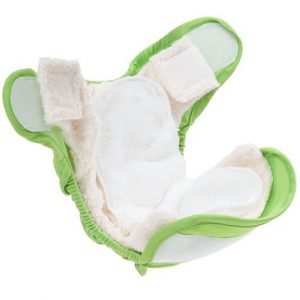REAL NAPPIES in a childcare setting
average baby will get through 6,500 nappies – and that’s one tonne of dirty/wet nappies that will be wasted/dumped, which will then between 250-400 years in the natural world, and quite possibly 500 years if they end up in rivers or the sea!
Part of the process of a single-use nappy deteriorating is breaking up into ever smaller bits of plastic (including micro- and nanoplastics) which get into the natural world, injuring and killing birds and animals and getting into the human food chain via fish and shellfish. The dangers of the chemicals found in plastics, and microplastics in the natural world are, of course, now well publicised.
At Tops Day Nurseries

Ideally we would use re-useable liners to collect the solids. The solids can then be flushed down the toilet and the inner laundered. However, “disposable” liners are more convenient when out and about but definitely can’t be flushed, so where a “disposable” liner is used it needs throwing into a yellow bins for incineration along with any nappy wipes used (whether plastic based or not).
At home “disposable” liners would go into general waste with disposable nappies and then potentially landfill, and at a cost of around 3x the purchase price, so re-useable is the much more responsible option.
Basic instructions
Always wash brand new bamboo, cotton or hemp nappies – the fabric is coated during manufacture so that the materials runs through the machines. If you don’t wash them 3-4 times (they don’t need drying in between) then liquids will not be absorbed, i.e. they don’t work!
If you’ve chosen nappies of a deep colour then the colour may run so wash separately at first. Follow manufacturers instructions on size – some are one-size-fits-all, others come in 3 sizes (weights).
Washing instructions
Nappies that have poo on them shouldn’t go into the machine with other washing so its often easier to do a separate nappy wash. However if you have a couple of nappies that are only wet and not soiled you could add them to a load of clothes or linen.
There is no need to soak nappies, just keep them in the waterproof bag until ready to wash (no longer than 3 days). Then turn the waterproof bag inside out into the washing machine – you don’t have to touch the dirty/wet nappies until they’ve been washed. Run a cold rinse cycle – rinsing away urine in a cold wash reduces smells. Warm wash in 40 or 60 degrees with no fabric softener.
We use the Ecoegg (great for sensitive skin, kinder to the environment and cost effective). You can use a non bio detergent. You can also add enzymes to help with removing poo stains.
Line dry, tumble dry on LOW or place on airer. The sun helps with bleaching out stains and killing any leftover bacteria and will keep nappies functioning well for longer. Do not put nappies on radiators as high heat can scorch the fibres causing them to become flat and non-absorbent; an airer next to a radiator is a better option and you can buy electric warm-air ‘wardrobe’ style driers which work particularly well.
The Tops trials 2019
Tops Day Nurseries plan to encourage every member of staff with a baby or toddler to use real nappies, and to role model this to parents.
Nappies will need to be taken home for laundering as most nurseries don’t have the facilities at work, and there are concerns about hygiene if we are washing different babies nappies at the same time. We are taking advice on this but we don’t have sluices to wash away the poo either and some change units are not next to a toilet, further complicating things.
From May 2019 Tops will introduce the staff parent trial:
Staff parents returning after maternity currently get 2 weeks of free childcare; they will also now get a set of washable nappies, to be returned when the baby is out of nappies so they can be used as spares at nursery. Nappies will be issued at the last return to work meeting so that they can be practised with at home.
All staff parents will be given a Tops Wetbag (more may be made available to them at trade price) to assist with transporting wet/dirty nappies home. Ideally all staff parents who have used real nappies will be willing to advise parents on real nappies, potentially making a real impact on the huge number of disposable nappies that Tops have to burn every week (currently costing each nursery around £1,000 per year!).
Tops waste management company will be monitoring the weights in their incinerator bins so that they can measure impact, with the aim of reducing waste. Nappies taken home to dispose of in domestic general waste is costing around 4% of the domestic rates bills for every person in the community, whether they have a baby in nappies or not. So in the interests of the natural world, and because surely we have much better things to spend our money on than trying to get rid of nappies, this is one more very important step to helping make the world a better place for our children.
Follow progress through our Real Nappy Campaign …

